This session opened with a high-level panel to commemorate the Council’s 10th anniversary. We heard from all 10 Council Presidents, the Special Procedures, and Human Rights Watch was honored to participate on the panel, and share our reflections on what the Council has accomplished, and challenges outstanding. It was a moment of hope, of vision, of celebration of what the Council could be, what it should be.
Yet throughout the session we saw points of order, designed to silence civil society speakers. We again saw a “no action” motion, presented in an attempt to shut down legitimate debate. We witnessed a barrage of hostile amendments designed to strip previously-agreed language on “human rights defenders” from any Council text.
We learned of yet more reprisals, as Bahraini human rights defenders were barred from attending the session.
We heard delegations pre-emptively announce that they will refuse to cooperate with the new Independent Expert on violence and discrimination related to sexual orientation and gender identity – even though cooperation with Council mechanisms is a requirement of membership.
We heard an unprecedented number of points of order, attempting to block Special Procedure appointments on unspecified grounds.
In short, in this 10th anniversary session, a serious question arises whether the Council can rise above the procedural and political wrangling that ultimately undermined the credibility of the former Commission on Human Rights.
What is this Council, if not a place where sensitive human rights issues can be debated on their substance? The people outside this room look to this body to set an example.
Just as the session opened in the wake of mass killings in a gay bar in Orlando, it closes in the shadow of murderous attacks in Istanbul, Dhaka, Baghdad and Saudi Arabia, leaving hundreds dead. Anti-immigrant rhetoric is rife across Europe. Hate crimes are on the rise in the UK following the Brexit vote. If ever there was a time to recommit to principles of human rights and dignity for all, it is now.
The challenges we face are global. Ten years into its mandate, this Council can do better. It needs to do better. Those who face violations the world over are counting on it.







